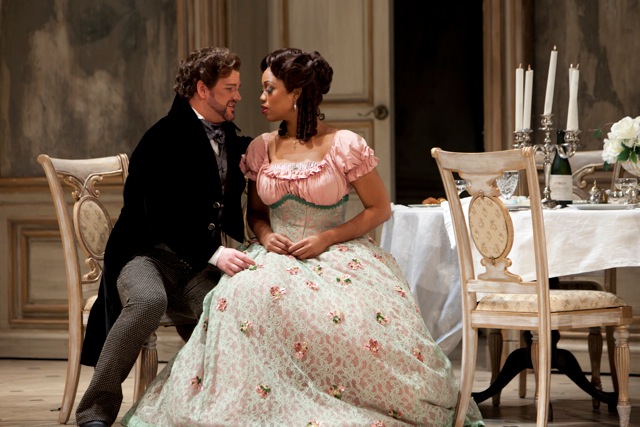Laquita Mitchell’s extraordinary Violetta gets New York City Opera back on track

Laquita Mitchell as Violetta and David Pomeroy as Alfredo in New York City Opera's "La Traviata." Photo: Pavel Antonov
After a bout of homelessness and a long and bitter labor dispute, New York City Opera got its act together at the eleventh hour. On Sunday afternoon it kicked off its new season with Jonathan Miller’s production of La Traviata at the Brooklyn Academy of Music. The event marks the first of several temporary homes it will inhabit in a mini-season that will also bring opera to John Jay College and El Museo del Barrio. The optimistic spin on things at City Opera is that “the people’s opera is returning to the people.”
In the event the modest, period-costume production became the vehicle for a triumphant homecoming for Laquita Mitchell, the Brooklyn-born soprano whose first Violetta revealed a phenomenally gifted singer with a luscious — but also vulnerable — voice. Mitchell grew up on a steady diet of Aretha Franklin in her grandmother’s home in Bedford-Stuyvesant but had little vocal training before auditioning for the La Guardia High School for the Arts in Manhattan where her teachers set her on the path toward opera. Since then, she has won top prizes at competitions at the Met, Houston Grand Opera and the Wiener Kammeroper; Jessye Norman has become a committed mentor.
Mitchell’s acting is a shade wooden, but she nonetheless turned out a three-dimensional Violetta thanks to her wide expressive range and big-hearted sound that contains just a hint of sexy smokiness. Her Sempre libera was enlivened by a rhythmic clarity that made it seem almost danceable — while allowing Mitchell to keep the top notes in “gioir” safe and short. She was touching in Act II, when Germont comes to talk her into leaving Alfredo, her voice girlish and hopeful at first when she thinks it will be but a brief separation, then noble and passionate as she understands the sacrifice she must make. In the Act III confrontation with Alfredo, we know she is lying when she professes to love the Baron from the way she makes her voice plain, even ugly. Her final scene was beautifully sung with a keen musical ear for phrasing. There was a sense of her struggling for clean entrances in upper range, but that may have been a function of having to sing in a reclining position. Overall, Miller shows an odd predilection for having his singers sit or lie down during the most passionate pronouncements. (Perhaps this was an authentic reenactment of 19th-century Parisian society, to go with the pretty pastel-colored crinolines and inoffensive unchanging interior set designed by Isabella Bywater.)
Alfredo, sung by Canadian tenor David Pomeroy, delivered a somewhat constricted Un di felice seated, leaning in on Violetta. When he was given room to stand and walk around in subsequent acts, his voice seemed to grow in resonance. He delivered some tender moments but his Libiamo lacked power and verve.
Stephen Powell was a noble but somewhat anodyne Germont with a beautifully round baritone that grew in emotional intensity throughout his Act II confrontation with Alfredo. The minor roles were ably sung on the whole, with only Karin Mushegain’s svelte mezzo standing out as a cat-like cross-dressing Flora. She seemed to be the only one truly at ease in the masked ball scene, which required a good deal of dancing from the members of the chorus. The men, enacting matadors, acquitted themselves honorably in a sequence of rhythmic footwork; the women seemed thrown off course by some Offenbachian Can-Can.
In the pit, Steven White presided over a pared-down ensemble of NYCO musicians evidently intent on proving their worth after the tenacious negotiations over contracts. The strings were particularly impressive in the scarily exposed introduction to the final act, playing with sensitivity and precision.
Considering NYCO’s rebranding of itself as a young, sharp and of-the-minute opera house over the past years, it was a strangely genteel production – stranger still when you consider that the Metropolitan Opera’s Traviata is now a minimalist, love-it-or-loathe-it affair imported from Holland. But as the intermission crowds buzzed with talk of Mitchell’s extraordinary talent, there was at last a sense that the discussion had shifted from the financial woes of the company back to the singing itself.
La Traviata will be repeated February 14, 16 and 18. Thanks to a gift from the Reed Foundation and the Peter Jay Sharp Foundation, all remaining tickets are $ 25 and are available from either BAM (718-636-4100; tickets@bam.org) or NYCO (212-870-5600; nycopera.com)